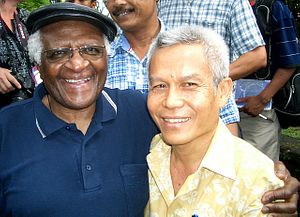Today marks the tenth anniversary of the disappearance of the Lao civil society leader Sombath Somphone. As in most of the past ten years, the occasion has been marked by commemorations and calls for answers about his disappearance – and an emanation of silence from the government in Vientiane.
On the evening of December 15, 2021, Sombath, the leader of Laos’ first and most prominent civil society organization, was stopped at a checkpoint on the outskirts of the capital Vientiane. The 60-year-old was then transferred to another vehicle, according to a grainy police surveillance video that emerged later, and was never seen again. After Sombath’s disappearance, the United States and other Western governments called for an investigation. The Lao government promised to do so but has never done much toward fulfilling it.
To mark the 10th anniversary of Sombath’s disappearance, 66 civil society organizations issued a statement to “renew calls on the Lao government to determine his fate and whereabouts and deliver justice, truth, and reparation to his family.”
“We have been pressing for justice and accountability for 10 years,” it added. “Once again, we are united in asking a simple and straightforward question to the Lao government: ‘Where is Sombath?’”
For the past decade, Sombath’s fate has surfaced repeatedly during Laos’ interactions with a host of international organizations and foreign governments. U.N. officials of various stripes have raised the issue with Vientiane, calling on the Lao government to launch a genuine investigation into his disappearance. But their invocation of Laos’ various obligations under international law has done little to push the government into any sort of meaningful action.
For a while, it kept up the charade of meeting semi-regularly with Sombath’s wife, Ng Shui Meng, who lives in Singapore, but according to the NGO statement, has not done so since 2017. As the statement says, the Lao government’s response “has been characterized by a catalogue of apparent inaction, negligence, cover-ups, and misleading statements, and an overall lack of political will to effectively address Sombath’s enforced disappearance.”
Before his abduction, Sombath, a U.S.-educated agriculture specialist, was an award-winning activist who ran Laos’ first and most prominent civil society organization. Born into a poor farming family in central Laos, he had avoided any involvement in politics, instead focusing on rural development. But before his abduction, Sombath had begun to encroach onto sensitive ground, digging into the massive deals that had offered land to wealthy foreign investors in exchange for investment capital.
Sombath is not the only Lao activist to have gone missing in mysterious circumstances over the past decade. By one count, more than 20 Lao citizens have been assassinated in Thailand, seemingly for political reasons, including a Buddhist monk and a member of the former Lao royal family. Over the past few years, as social media like Facebook have become more popular, the ruling Lao People’s Revolution Party (LPRP) has also arrested several of social media users for posting critical comments posted on their profiles.
Presumably, the Lao government would like nothing so much as for Sombath simply to be forgotten, though this has been complicated by the efforts of international and regional advocacy groups to ensure that the flame of his memory remains alight. At the same time, the more time elapses, the less likely it is that the LPRP will see any reason to be more forthcoming.
Pending some sort of change of regime in Laos, this annual ritual of remembrance seems set to persist each year, against a backdrop of a stony wall of silence from the halls of power in Vientiane.

































